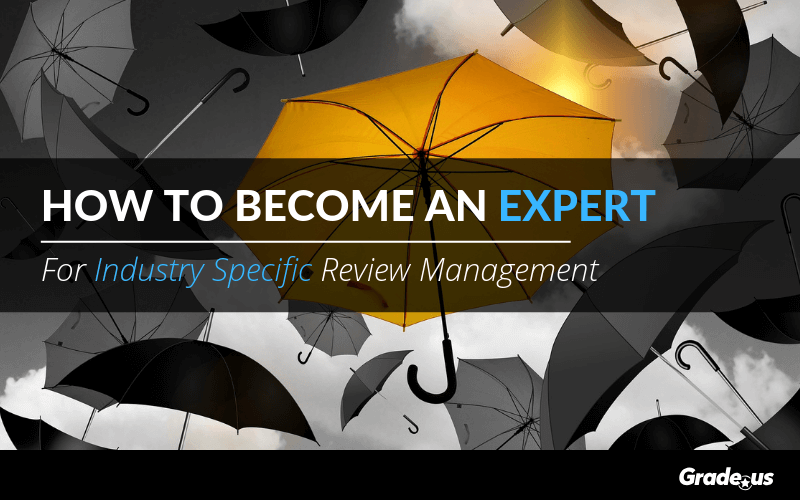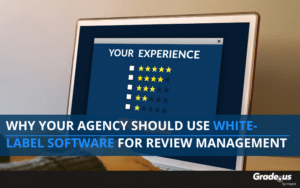Updated: 1/9/2020
What's the easiest way to sell review management?
You already know the answer. It's specialization. Industry specific review management gives you the ability to develop deep expertise in a particular industry or niche.
Why does that matter?
Competition. Most agencies and consultants are generalists, but the market is shifting towards specialization.
Why?
Clients are looking for deep expertise
Generalists are everywhere.
When clients hire a good generalist to handle their review management campaigns things go well. Generally. As long as they're able to get the kind of high-quality reviews they need to make their campaigns perform. Easier said than done.
It's different with specialists.
Specialists attract a different level of customer zeal. They understand the industry or niche at a much deeper level so they're able to...
- Draw out deep, in-depth responses from customers
- Flush out conversion triggers (e.g., customer stories, emotion, and focus areas)
- Quickly identify and isolate customer evangelists and cheerleaders
- Amass a large volume of deep, in-depth reviews
- Create review requests that encourage vulnerability
- Get past a customer’s desire to comply with the social contract and be “nice”
I know.
This may not sound like much but it's an incredible amount of impactful detail. It's the difference between a review that looks like this:
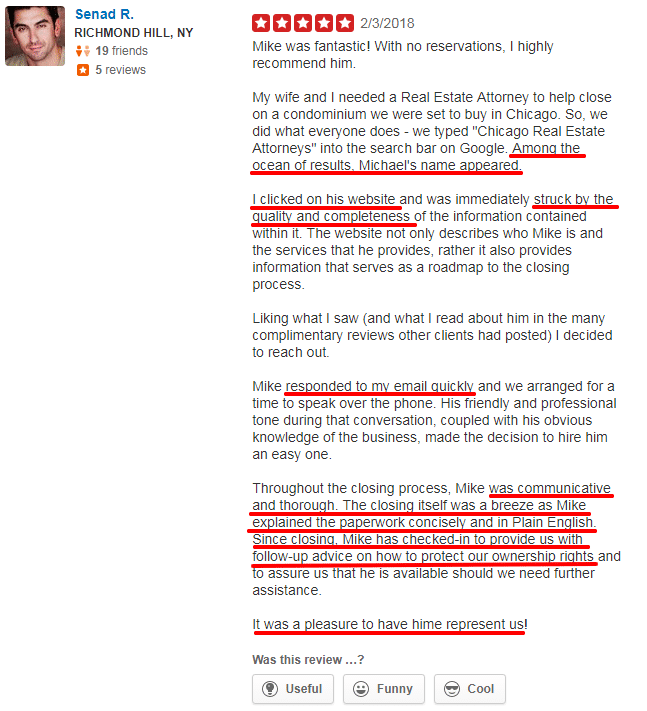
And one that looks like this:

They're both reviews for the same attorney. See the difference between these two?
Obvious, right?
What's not as obvious is the reason or cause of these distinctions. There's a difference between generalists and specialists but it's not clear what it is.
The rise of the T-shaped specialist
The T-shaped specialist is powerful.
Specialists consistently outperform generalists and dabblers. They have a unique toolset and experiential resources available to them that others don't have.
These aren't ordinary specialists.
They're T-shaped specialists. A breed that's above and beyond both the generalist and specialist varieties. I suppose the most obvious question then is this.
What's a T-shaped specialist?
A T-shaped specialist is someone who is (a.) a generalist, highly skilled in a broad set of categories forming the top of the "T" and (b.) an expert or specialist with deep, precise knowledge in a specific industry, niche or category, forming the vertical leg of the "T." As an expert or specialist, they stand out as part of the top 1 percent in one specific area.
See the difference?
As professionals go, true T-shaped specialists are incredibly rare. There are lots of people who know how to get reviews from customers. Not very many know how to get customers to write reviews that 2x client revenues.
This is your chance.
T-shaped specialists know their industry
Do you?
The average professional is inclined to say yes. Ask them if they have a keen understanding of the reviews in their industry and they'll say "of course."
Is this true?
Not usually. Generalists and specialists tend to be one-sided. Ask them how review sites differ from one industry to another and you'll get blank stares.
But you need to know.
Here's how reviews differ from one industry to another.
· Prominence. Reviews play a greater role in certain industries than others. Hotels, restaurants and travel services rely more heavily on reviews than manufacturing and skilled trades. This doesn't mean they're unimportant in these industries. It means customers are more conditioned to search for reviews in these industries.
· Variance in priorities. Customers in one industry may feel that aesthetics are crucial while customers in another industry may not care at all. These priorities develop around culture — Cultures around people, individual organizations, specific locales and industries. T-shaped specialists are aware of these variances enabling them to quickly recognize and adapt to these specific cultures.
· Supplemental metrics like, verified purchase, validated reviewer, or current user provide you with additional data on customers. For example, verified purchase tells you a customer is writing a review based on their genuine thoughts and feelings.
· Validators and linguistic ticks. T-shaped specialists know their client's customers. They know the validators they look for and they're aware of the linguistic ticks used by specific customer communities. For example, If your client sells to vegans or specific mom communities you know what "Crunchy, DH or Co-sleeping" means. You know these moms buy organic, avoid BPA's and they typically vote Democrat. If you sell consumables, you know the first place they'll look is your ingredients list.
· Conversion focus. As a whole, reviews can confirm or derail a sale. When it comes to conversions, reviews aren't created equal. Some industries are sensitive to reviews. Others (e.g. attorneys, high priced consultants and established brands) are less affected by negative reviews, so long as sacred cows are respected. You'll need to identify (a.) which reviews drive conversions (b.) why they drive conversion (so you can reproduce it) and (c.) what specifically in these keystone reviews gives customers the impetus to act.
· Variance in values. "Profitability" is often perceived as a dirty word in the healthcare and non-profit industries. "Traditionalism" and "loyalty" are demonstrably important to southerners. Each industry and locale has its own set of rules, values and norms. T-shaped specialists speak to these ideals when they interact with customers. They learn the rules their audience follows and they abide by them.
That seems like a lot.
At first glance, it seems this is an overwhelming amount of data to keep track of. Do you really have to observe and monitor these data points to become an expert in a specific industry?
Nope.
Because the data points that matter present themselves.
Let's look at a few industries.
Healthcare
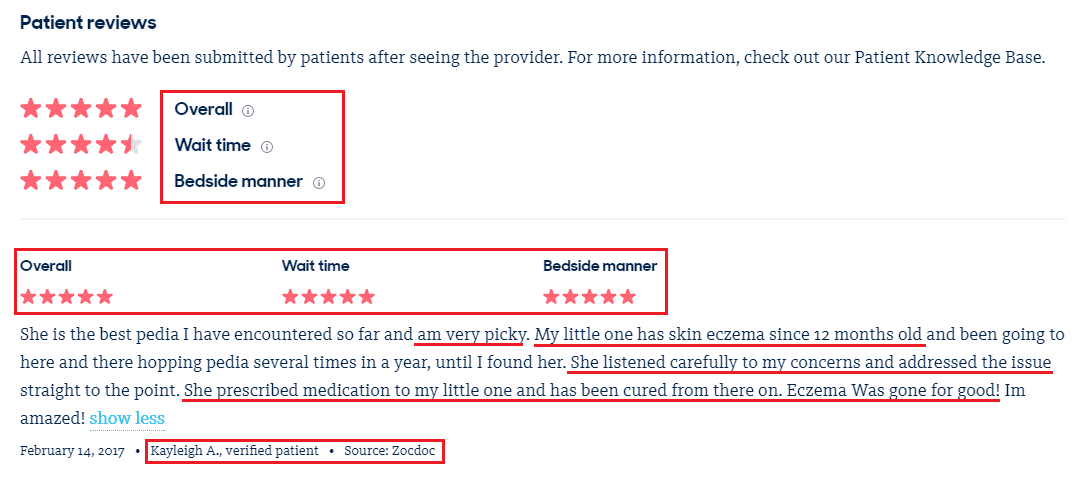
The criteria for the healthcare industry is fairly straightforward. The obvious criteria is satisfaction overall, wait times and of course bedside manner.
What about the hidden criteria?
1. Verified patient reviews
2. Patient feels validated by doctor
3. Patient research and access to data
4. Facility aesthetics/cleanliness
5. Patient results
Why do these criteria matter?
They're details you can ask your client's patients about. Get detailed feedback on these obvious and hidden criteria and you'll quickly become an expert on what matters to reviewers.
Industry specific review sites to target
Home Services
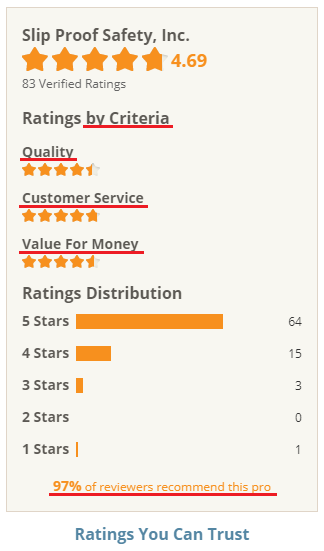
When it comes to evaluating home services, your client's customers typically aren't the experts. It makes sense then that the evaluation criteria in these industry reviews are simple. The obvious criteria are quality, customer service, and value for the money.
What about the hidden criteria?
1. Contractor professionalism
2. Timeliness (completing projects on time and in-budget)
3. Customer expectations (met or exceeded)
4. Agreeableness (easy/pleasant to work with)
5. Keeping your word
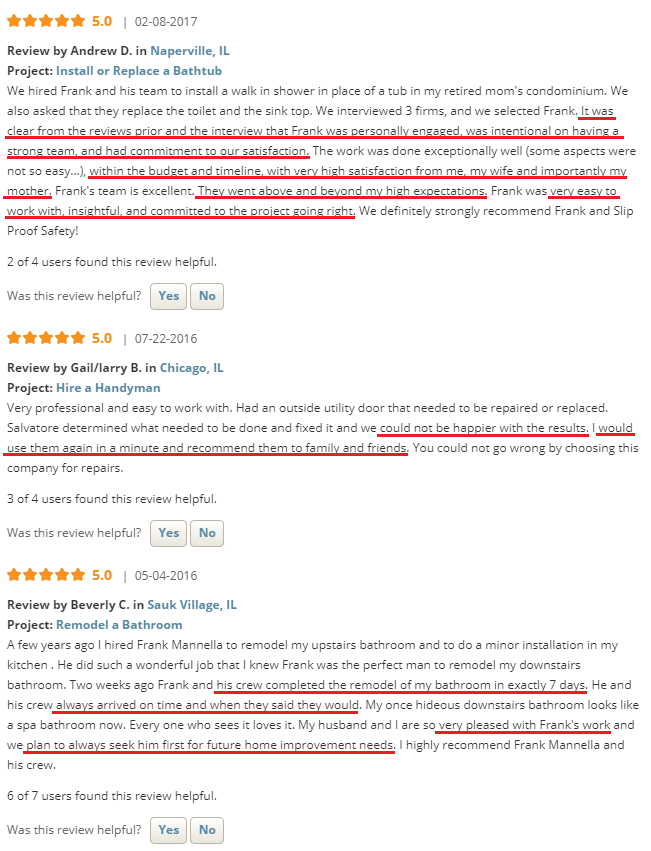
Reviewers confirmed each of the details mentioned in the past.
Industry specific review sites to target
Automotive
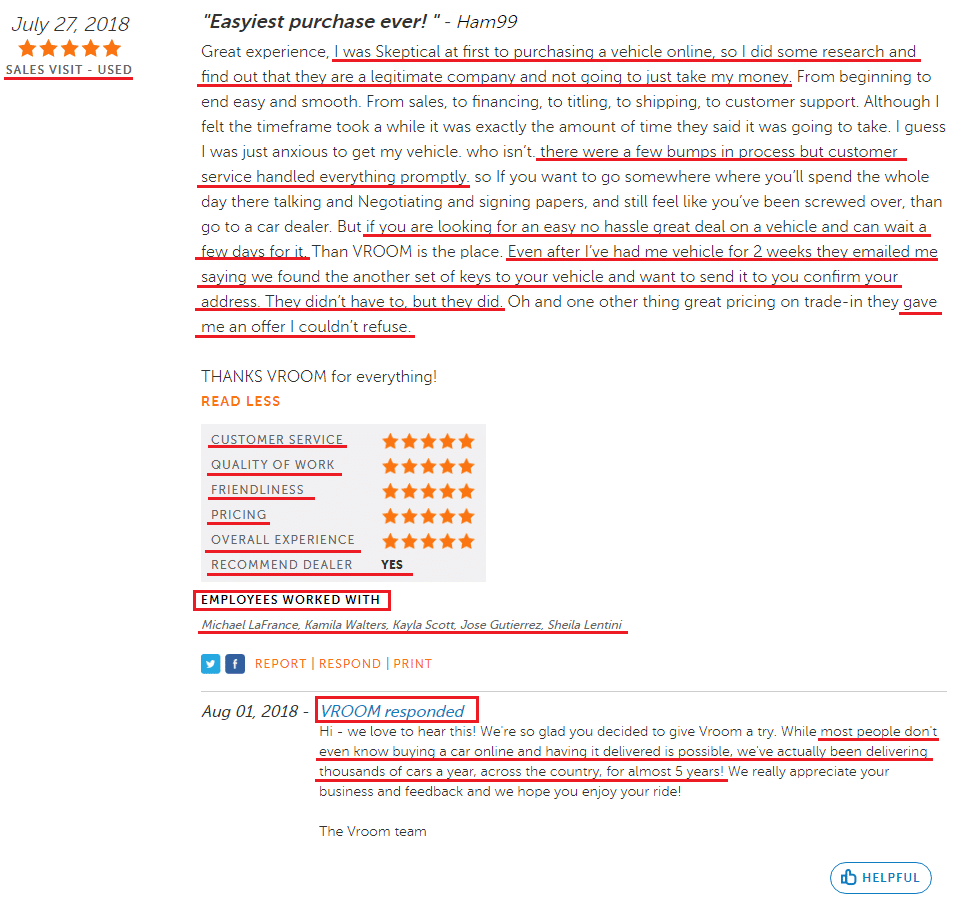
The obvious criteria? Customer service, quality of work, friendliness, pricing, overall experience, and "would you recommend."
What about the hidden criteria?
1. Smooth easy process
2. Timeliness (the purchase process fits promised timeframe)
3. No buyer's remorse
4. Being/feeling taken care of
5. Negotiating in good faith
6. Beginning with skepticism and apprehension
7. Not being taken advantage of
Industry specific review sites to target
Like it or not, the automotive industry has a reputation for duplicity. Customers arrive with fear, expectations and a feeling of impending disaster. T-shaped specialists study their client's reviewers. They absorb the lessons from their feedback.
In-depth industry specific review management deep dives
These examples are purely surface level looks into the industries of the clients that you serve. Looking to learn more about the nuances of review management for all of the top industries that require review management? Check out our comprehensive educational articles:
- Restaurant Review Management
- Legal Industry Review Management
- Healthcare Industry Review Management
- Real Estate Review Management
- Home Services Review Management
- Hospitality Review Management
- Wedding Industry Review Management
- Automotive Industry Review Management
- Software Industry Review Management
- Assisted Living Industry Review Management
- Financial Services Review Management
Each of these industry specific review sites…
Have their own rules, norms, customers and expectations. It’s important that you learn (and follow) the rules for each site, in addition to review mainstays like Google, Facebook and Yelp.
Can you see what's happening?
These data points are customer driven! Customers outline what matters most to them in their online reviews. Wait a minute. How does this help you become an expert in a specific industry?
With directives.
It shows you where to direct your learning. You'll need to follow specific strategies if you want to achieve expert status.
But how?
Step #1: T-shaped specialists listen to ugly truths
They take in all of it.
Beautiful truths, ugly truths, uncommon truths, generic truths. They take a long hard look at their client's customers working continually to understand their perspective.
What does that mean?
They read:
- The (good, bad, ugly) reviews customers leave their clients
- The (good, bad, ugly) reviews customers leave their client’s competitors
- Relevant discussion boards, Q&A sites, forum and blog posts, assessing industry sentiments
- Search for customer desires, goals, fears, frustrations and problems
There's no judging, no condescension or contempt for the audience or the industry. Distance gives them objectivity so they're able to approach each topic as an outsider.
You should too.
Your goal at this point is learning. You're in evaluation mode.
- Are customers suggesting that your client’s product is inferior to a competitor’s? Write it down.
- Have reviews disclosed a competitive advantage or value proposition your clients aren’t using? Save it.
- Are specific concerns and objections coming up repeatedly? Recommend a solution.
- Is demand decreasing? Is sentiment shifting negatively? Tell clients the kind truth.
They take everything in.
Step #2: T-shaped specialists accept reality as it is.
The truth can be painful.
It can be exciting, beautiful and ideal. But it can also be difficult, unpleasant and grim. You may discover that your clients have an adversarial relationship with their customers.
Or they don't get along.
Maybe customers have taken advantage of them. Maybe they have an ideal relationship with customers. Whatever the scenario, it's your job to uncover it and then to accept it.
- Do your clients badmouth their customers publicly? Own it.
- Is your client’s review profile top-heavy or lopsided? Outline it fully.
- Are you losing revenue to a competitor that’s disrupted the industry? Prepare to respond or pivot.
This sounds like generic advice.
But it's actually quite the opposite. This is what makes T-shaped specialists so valuable. They're able to tell the kind truth. They're able to accept reality.
So what?
Clients often aren't always willing to accept reality as it is. If they're used to being comfortable or on top they're more prone to denial and far more likely to fight you. How do I know?
History tells us.
· Toys"R"Us ignored the shifting landscape and they went out of business
· Kodak created the world's first digital camera in 1975 but never let it see the light of day
· Woolworths, a 131 year old company with 30,000 employees closed in 2009 after failing to adapt to competition
Denial isn't just a big business mistake.
Small businesses make it too — this is the problem you face as an expert. Your experience gives you the ability to see what's coming next. The trouble here is, if it's unpleasant, clients won't want to accept that reality.
You'll need to accomplish two things.
1. Accept your client's reality as-is
2. Get your clients to accept their reality as-is
This is key.
Doing this means your client's industry specific review management campaigns are far more likely to succeed.
Step #3: T-shaped specialists test/act on their learning
T-shaped specialists test.
They work to validate the lessons learned from reviewers. Whether it's a client or competitive review, T-shaped specialists validate and iterate.
They watch their analytics.
They ask questions and request feedback from customers. Why did you buy this product? What were your concerns coming in? What would have been a deal breaker for you?
Here's the thing.
Your learning and testing give you the ability to verify that the data your client's customers are feeding you (via reviews) is accurate. That it's going to impact their bottom line directly.
This testing preserves your client relationship.
If reviewers are right, your client's conversion rate goes up. If reviewers are wrong, you figure it out before the damage is permanent. Your client's conversion rate still goes up.
Wait a minute!
You may be an expert in a specific industry or niche, but that doesn't mean prospective clients will automatically believe you're an expert. How do you prove it to them?
With market research.
Market research is how you convince clients
Market research is the methodology you use to demonstrate that you're an industry-specific expert with deep knowledge. Catch you accomplish this without market research though? Maybe this something you should already have experience with?
The data says no.
CB insights performed post mortem research on business failure. They listed the top 20 reasons startups fail.
Take a look.
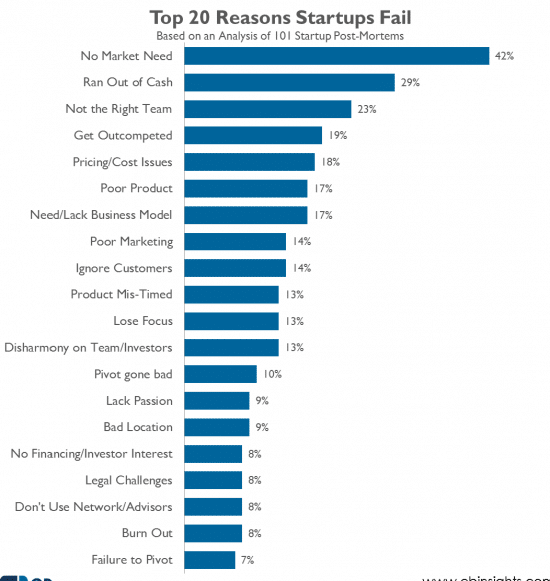
Source: https://www.cbinsights.com/research/startup-failure-reasons-top/
Can you see it?
Seven of the reasons in their list are due to market research failure.
1. No market need. Creating a product or service clients don't want or need. This screams poor market research.
2. Get outcompeted. This usually means there's no value proposition, poor presentation, inadequate risk reversals (if any) and a host of other problems that are typically solved by good market research.
3. Pricing/cost issues. If you know your target audience, you've identified the customers who are willing and able to pay for your product or service. Which means you know what they can afford.
4. Poor product or service. This typically means your product or service isn't the solution to your client's problem.
5. Poor marketing. If you don't know your audience, you won't be able to persuade them.
6. Ignore customers. When brands believe they "know" their customers (better than they actually do), they often choose to ignore the feedback we received from actual customers.
7. Product mistimed. Your market research would identify any red flags before launch. If your product or service launch was mistimed, you'd run into a host of problems. Customers don't understand your product or service; they're not sure how to use it, they don't believe your claims, they've never seen anything like your product or service before.
As it turns out, these are the problems many agencies struggle with. They believe they "know" their clients better than they actually do. They launch their industry-specific review management services, only to find they lack the credibility needed to sell themselves effectively.
Which is a huge problem.
Prospects in your sales funnel are going to tell you the real reasons why they refuse to pay for your review management services. They're just going to ignore you.
This is why you need market research.
Here's a step-by-step market research guide you can use to sell your review management services in a specific industry or niche.
Action step #1: Define your audience
As an agency, you won't be able to sell to everyone successfully. Your ideal client needs to meet a few very specific criteria if you'd like your agency to be successful.
- They’re able to pay for your services
- They’re willing to pay for your services
- Your agency can solve their problems
- They’re willing to accept your care, guidance and protection
There are other factors of course, but these are the non-negotiables. If you have these, you have what you need to serve your clients profitably.
How do you do this?
1. Identify the demographics and psychographics of clients who are willing and able to pay for your expertise. You want to focus on specific criteria (e.g., location, industry, business size, budget, revenue, personality, values, etc.)
2. Verify that you have the know-how, team and procedures in place to solve your client's review management problems.
3. Screen clients via behavioral and outcome markers, so you avoid destructive clients - arrangers, corrupters, disruptors, slanderers and schemers.
What if you are approached by clients who aren't a fit?
Your answer should be No.
This post on saying no to reputation management clients breaks the step down in further detail, showing you when and how to say No to clients you disqualified.
Action step #2: Reach out to your audience or a proxy
You're looking for intel.
You can get this Intel in one of two ways:
1. Identify 5 to 10 prospects who fit the criteria of an ideal client. They should be clients who are willing and able to pay for your review management services.
2. Identify 5 to 10 pundits who have expert level knowledge of your ideal client. If you're entering the legal industry and you're targeting attorneys, for example, you could reach out to retired attorneys, former attorneys, law firm advisors, Judges or commissioners.
Next, ask for an interview. Make it clear that you're not looking to sell; you're looking to learn.
You just need Intel.
Be upfront with them. Tell them you want to learn how to best serve attorneys and law firms in a specific practice area, say real estate. The more specific you are with your requests the better.
Be open and transparent.
One successful interview should be sufficient. Your interview should be focused on extracting both verbal and nonverbal communication; this means:
- A face-to-face interview is ideal. If you can’t get that…
- Video chat via Zoom, Skype, Slack, Hangouts or Discord is the next best thing. If you can’t get that…
- An audio interview via phone, Uber conference, Slack, Discord or RingCentral.
Next, you need to record the interview. Do what it takes, get permission from your interviewee.
Here's why.
You should be focused on what your interviewee is saying, not on note taking. You need to be mentally and emotionally present to catch gateway comments or comments that need follow-up. If you absolutely need to take notes, take them right after the interview or get someone to take notes while you focus on listening. Don’t use notes in place of the recording. You lose all kinds of information.
Action step #3: Ask the right questions
Your request for an interview is useless if you fail to ask the right questions. Most agencies can be bothered to interview their target audience. Those that do tend to get bogged down here. They're not sure what to say, they don't know which questions to ask and they're afraid to ask for the information they need.
Here's a list of questions you can use in your interview.
1. A list of all the problems your ideal customer has that creates the need for a product or service like yours.
2. What’s the biggest problem from their perspective?
3. Why is that the biggest problem?
4. What’s the consequence if that problem isn’t solved?
5. What does a solution to that problem look like to them?
6. What’s the second biggest problem from their perspective?
7. Why is it a problem?
8. What’s the consequence if that problem isn’t solved?
9. What does a solution to that problem look like to them?
10. Let’s say your product meets their needs and they’re interested. What are their main objections to buying?
11. What’s the biggest risk factor when it comes to buying your product or service? What makes them nervous or afraid of doing business with you? (get them to describe it)
12. Is there more than one risk factor?
13. What would cause/motivate them to give you a testimonial?
14. What would make your product or service unique from their perspective?
15. How do clients find you now? How do your competitors find clients?
These questions create dialogue.
Getting solid answers to these questions from an expert in your target industry is an absolute gold mine. Using this information you can:
- Create an unbreakable value proposition. True uniqueness that’s impossible for competitors to copy. If they somehow manage to copy it, it’s useless to them because you did it first.
- Present your business properly (from your client’s perspective). Clients are focused on their beliefs, what they want, how they feel, what they think — presenting your business properly = bypassing your client’s mental and emotional filters.
- Communicate with clients using their own words, dialect, jargon or slang. Pundits claim you should avoid these, I disagree. These communication extras establish credibility and authenticity. If your competitors haven’t done the work, it’s something they won’t be able to replicate.
- Defuse objections, counter buyer’s remorse and dramatically reduce risk. This isn’t just about solving these issues, it’s how you go about it that’s crucial. These details vary by industry, segment, niche or level.
Most of your future marketing success depends on the work you do in these three steps. If you take the time to do this upfront work, you're able to persuade and convert more clients in less time, at a lower cost and with a higher lifetime value.
This isn't about data.
Industry specific review management isn't about learning
It's about people.
Sure, you use learning to serve your clients and their customers. But at the end of the day, your focus is on one thing.
The customer.
What's the easiest way to sell review management? Specialization. Competition and globalism mean generalists are fast becoming a commodity. The global market is shifting steadily towards specialization.
But specialization isn't enough.
Clients are looking for deep expertise. They're looking for T-shaped specialists. Professionals who are highly skilled in a broad set of categories but also have deep, precise knowledge in a specific industry.
That should be you.
Make the right moves and it will be you. You'll be part of an elite group, the 1 percent. The T-shaped professional who achieves what generalists and specialists can't.
Rapid growth via online reviews.
About the Author
Andrew McDermott
Andrew McDermott is the co-founder of HooktoWin. He shows entrepreneurs how to attract and win new customers.

